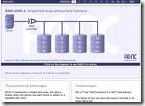 What if your hard drive decides to enter the Elysian Fields in this very moment? Sure, you could simply get a new hard drive to substitute for the defective one with a quick run to your favorite hardware store. And with last night’s backup you might even reconstruct your installation quickly. But what if you don’t have a backup? The truth to be more like this: many users don’t even have a backup, or it simply is too old and thus useless for recovering any useful files at all. In case of real hard drive damage, only a professional data recovery specialist can help you – say bye-bye to your vacation savings!
What if your hard drive decides to enter the Elysian Fields in this very moment? Sure, you could simply get a new hard drive to substitute for the defective one with a quick run to your favorite hardware store. And with last night’s backup you might even reconstruct your installation quickly. But what if you don’t have a backup? The truth to be more like this: many users don’t even have a backup, or it simply is too old and thus useless for recovering any useful files at all. In case of real hard drive damage, only a professional data recovery specialist can help you – say bye-bye to your vacation savings!
Hard drive failure is especially disastrous for smaller companies working with a single server and a single disk, if they do not have a complete and working data backup at hand. The whole situation is even more complicated if the broken hard drive is a member of a RAID array. Neither hard drive failure in RAID 1 nor RAID 5 will result in data loss, since this scenario has been taken care of by the choice of these RAID levels in advance. But the risk of human error increases: self-made data loss occurs if you accidentally substitute the wrong drive in a degraded RAID 5 array (one with a failed hard drive).
But not all hard drives that show failure symptoms are defective. Sometimes, so called “soft errors” can be fixed using data recovery software. But even in this case, you should weigh the risks to see if it makes sense to take care of the problem yourself or get help from professionals. You might not be able to detect a controller failure right away, for example; usually, users assume a problem with the hard drive. Here is our rule of thumb: if you hear clacking sounds in the potentially defective hard drive, or if the computer’s S.M.A.R.T. function indicates an error during the boot process, something is wrong for sure.
What can you do once you know that an important hard drive is definitely broken? Or what happens if you pulled the wrong drive out of the slot while you were desperately trying to save your data? First of all: don’t panic! You need to act systematically and thoughtfully to be successful, as well as to ensure that you spend as little as possible on recovery – costs can hits four digits easily.

